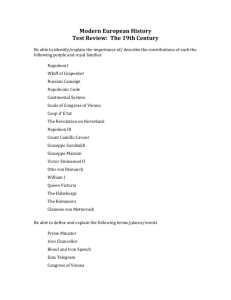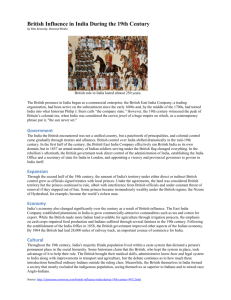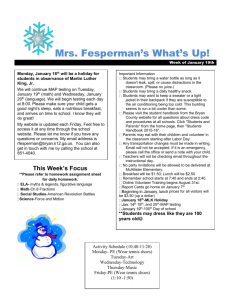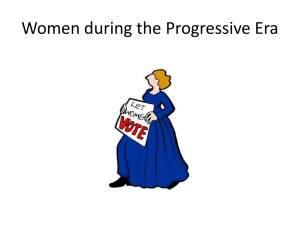Unit 10 Outline Identify MAJOR ERAS AND EVENTS IN U.S.
advertisement
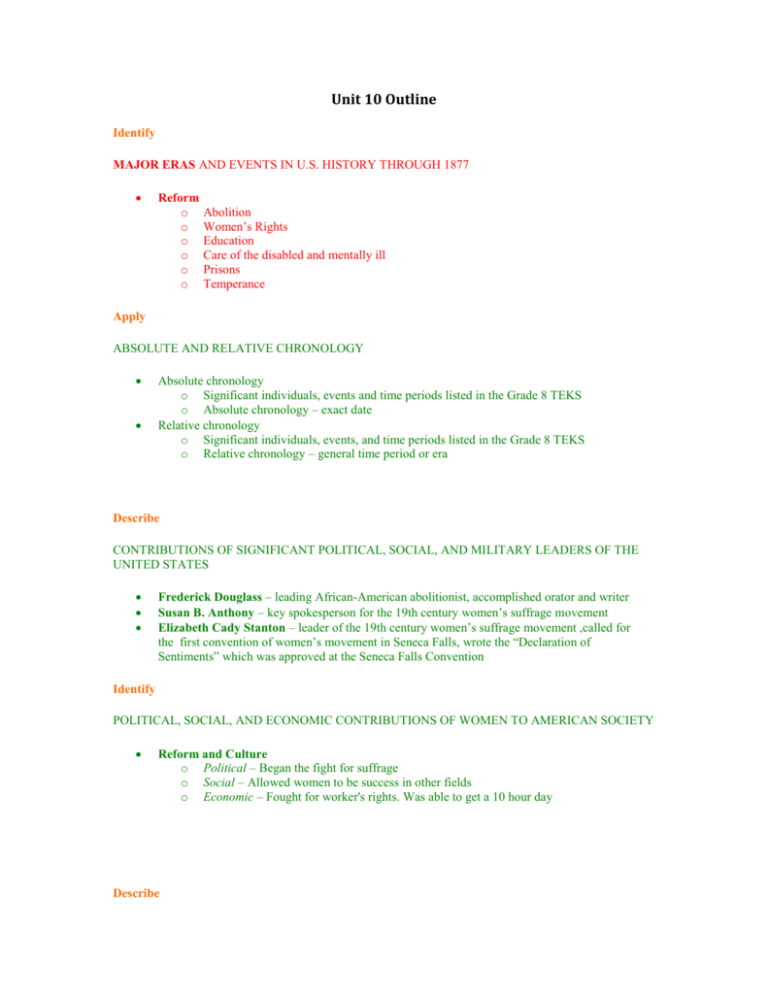
Unit 10 Outline Identify MAJOR ERAS AND EVENTS IN U.S. HISTORY THROUGH 1877 Reform o o o o o o Abolition Women’s Rights Education Care of the disabled and mentally ill Prisons Temperance Apply ABSOLUTE AND RELATIVE CHRONOLOGY Absolute chronology o Significant individuals, events and time periods listed in the Grade 8 TEKS o Absolute chronology – exact date Relative chronology o Significant individuals, events, and time periods listed in the Grade 8 TEKS o Relative chronology – general time period or era Describe CONTRIBUTIONS OF SIGNIFICANT POLITICAL, SOCIAL, AND MILITARY LEADERS OF THE UNITED STATES Frederick Douglass – leading African-American abolitionist, accomplished orator and writer Susan B. Anthony – key spokesperson for the 19th century women’s suffrage movement Elizabeth Cady Stanton – leader of the 19th century women’s suffrage movement ,called for the first convention of women’s movement in Seneca Falls, wrote the “Declaration of Sentiments” which was approved at the Seneca Falls Convention Identify POLITICAL, SOCIAL, AND ECONOMIC CONTRIBUTIONS OF WOMEN TO AMERICAN SOCIETY Reform and Culture o Political – Began the fight for suffrage o Social – Allowed women to be success in other fields o Economic – Fought for worker's rights. Was able to get a 10 hour day Describe HISTORICAL DEVELOPMENT OF THE ABOLITIONIST MOVEMENT 1807 – Congress banned the importation of African slaves into the United States and then demand began to end slavery 1820 – 1840 – Abolitionists grew in number 1840 – 1850 – Abolitionist leaders Frederick Douglass and Sojourner Truth began to speak out across the nation, the Underground Railroad began to make an impact, and the women's movement joined in Evaluate IMPACT OF REFORM MOVEMENTS Public education – opening of public schools primarily in the North as well as private grade schools and colleges by churches and other groups Temperance – Organized societies that worked at trying to stop the drinking of alcohol. Some states passed laws that made it illegal to sell alcohol Women's rights – well organized groups that fought for better working conditions for women. Were able to pass a federal law that ordered a 10 hour working day Prison reform – Pushed for separate jails for women, men, and children and called for the mission of prisons was to rehabilitate Care of the disabled – Building of new hospitals for the mentally ill, deaf and blind. Describe RELIGIOUS MOTIVATION FOR IMMIGRATION AND INFLUENCE ON SOCIAL MOVEMENTS Second Great Awakening brought more denominations that intensified the lines between classes and regions. It spawned many of the humanitarian reform movements, eg., prison, women’s rights, temperance, and abolition of slavery Describe DEVELOPMENTS IN ART, MUSIC, AND LITERATURE THAT ARE UNIQUE TO AMERICAN CULTURE Including, but not limited to Literature o Transcendentalism – an American literary, political and philosophical movement in the early 19th Century (example authors: Ralph Waldo Emerson and Henry David Thoreau), they were critics of their contemporary society for its unthinking conformity and urged each individual find their independent relation to the universe (particularly utilizing solitude in nature) o Emily Dickinson o Walt Whitman – Leaves of Grass o Nathaniel Hawthorne – The Scarlet Letter o Edgar Allan Poe Art – Landscapes o John James Audubon- drew American wildlife o Hudson River School artists – their paintings depict the American landscape and reflect three themes of America in the 19th century: discovery, exploration and settlement Music o Slave spirituals and gospel music o “Battle Hymn of the Republic” – written at the beginning of the Civil War, used music from the abolitionist song “John Brown’s Body”, became a popular Civil War song of the Union Army and later a well-loved patriotic anthem Identify EXAMPLES OF AMERICAN ART, MUSIC, AND LITERATURE THAT REFLECT SOCIETY IN DIFFERENT ERAS Art (19th century ) o Albert Bierstadt’s River Landscape Music (19th century) o Battle Hymn of the Republic (lyrics by Julia Ward Howe) o Dixie (lyrics by Daniel Decateur Emmett) Literature (19th century) Mark Twain’s The Adventures of Huckleberry Finn Analyze RELATIONSHIP BETWEEN FINE ARTS AND CONTINUITY AND CHANGE IN THE AMERICAN WAY OF LIFE Increase in an educated population Improve financial ability to purchase and participate in the fine arts Concepts – Reform- to amend or improve by change of form or removal of faults or abuses. Suffrage- the right of voting. Abolition- the act of abolishing (ending or stopping something)

